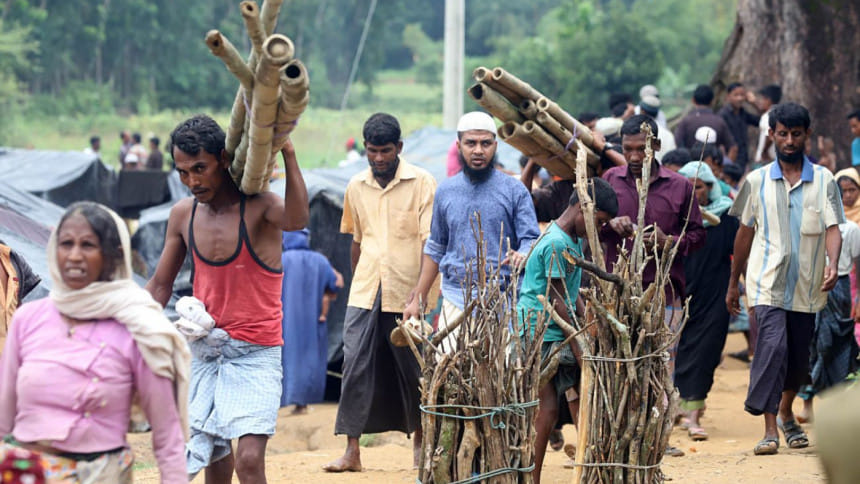Soft underbelly of connectivity projects?

One would have thought that the much-heralded plans for regional, sub-regional and inter-regional connectivity projects should have added up rather than subtracted from each other. But that is not to be! This is because the projects have been primarily envisioned as mutually rivalling rather than complementary.
Take for instance, the OBOR of China and Big "B" of Japan that Bangladesh has agreed to be a party to. But India, though a part of the Japanese initiative, does not look kindly on the former, to put it politely.
The sponsoring or leading country of such mega-projects nurtures an idea of expanding its sphere of influence through economic and trade blocs or groupings with like-minded countries joining in like a phalanx, as it were. This is, however, not to rule out the possibility for forging linkages between various infrastructures or co-option of one member country of a grouping into another bloc at a future date.
The realpolitik construct of the Cold War era between the two superpowers along with their allies gave way to détente in 1990's after the dismemberment of the Soviet Union. Realpolitik meant that each superpower pursued a policy of placing its material greatness and success over the other before all other considerations. In the détente that followed, an amorphous multipolar world seeped into the void that the era of disengagement had produced. Then the Trump presidency in the US abdicated the world's only superpower's role leaving a vacuum which China stepped in to fill by an open declaration. Chinese President Xi Jinping in his New Year's message articulated his commitment to play an enhanced developmental role in the world.
Now, we have embraced a geopolitical era in which a country positions itself in relation to other countries based on its assessments of effects and importance of its geographical location. In other words, a country's foreign policy is set in and to a large extent determined by its geopolitical realities. It can be said, just as Bangladesh's foreign policy has been shaped by its geographical position and historical evolution, so has its foreign relations been influenced by how other countries conducted their relations with Bangladesh.
Examples of how Bangladesh's foreign policy and foreign relations have synchronised in challenge-response dynamics at the cusp of an eventful diplomatic year opening out to an equally, if not more, surcharged geopolitics in a new year.
We left 2017 on a note of striking a point of equilibrium in our relations with big powers on the question of handling militancy, approach to ISIS and entering into an understanding with the EU to take back "illegal Bangladeshi immigrants" in lieu of a European commitment to help rehabilitate them in Bangladesh.
In the immediate aftermath of Bangladesh's January 5, 2014 election, the EU Parliament adopted two resolutions of significance to Bangladesh's reputation. One clarifying EU's position on the trial in international crimes tribunal against the 1971 war criminals and collaborators; and the second, iterating the EU's position on Jamaat-e-Islami.
But the Rohingya crisis came about and continues to be a litmus test of Bangladesh's relations with countries it had otherwise made huge strides to befriend and secure partnership agreements with.
After India, Bangladesh has assiduously tried to draw cooperation from China and Russia, the two countries that were instrumental in providing crucial support to Myanmar against any effective UNSC resolution on the country to make it accountable for its genocide on Muslims in Rakhine state.
In the face of mounting moral international pressure on Myanmar to behave, Bangladesh went so far as to accept China's mediatory role between Myanmar and Bangladesh to solve the crisis bilaterally. This has practically taken a trilateral form admittedly detracting from a full and binding internationalisation of the crisis.
Beijing like Moscow could not countenance UN's direct involvement, although practically a UNHCR participation is considered crucial in carrying forward voluntary, safe and sustainable repatriation and rehabilitation of the Rohingyas back home.
A datelined Kolkata Ashis Biswas news analysis carried in Dhaka Tribune on January 16, provided a new perspective on Indo-China rivalry on connectivity projects pertaining to Myanmar and interests of India and Bangladesh converging on the issue of speedy repatriation of Rohingyas from both countries.
The fresh assertion of Chinese power in Myanmar "may negatively impact more than regional connectivity projects and economic development—what concerns India (as well as Bangladesh) is China's near total support to Myanmar on the Rohingyas issue."
According to the analysis, when the time comes to discuss repatriation of the 40,000 Rohingyas currently on Indian soil, Myanmar may impose the same entry condition on India that it has on Bangladesh.
Shah Husain Imam is adjunct faculty at the East West University, a commentator on current affairs, and former Associate Editor, The Daily Star.
Email: [email protected]





Comments